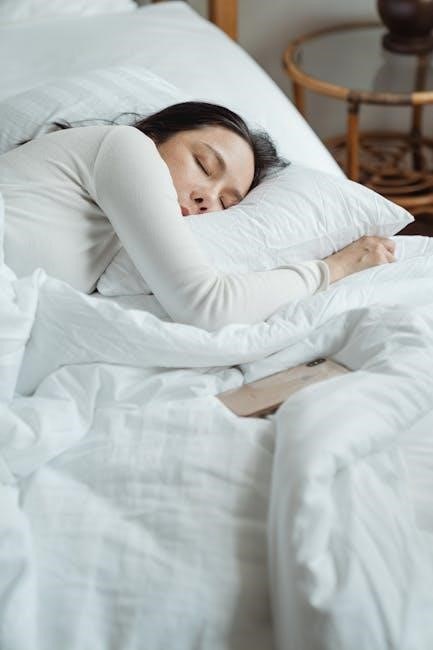
Sleep hygiene refers to practices that promote better sleep quality and duration. It involves habits like maintaining a consistent sleep schedule and creating a relaxing bedtime environment.

1.1 Definition of Sleep Hygiene
Sleep hygiene refers to a set of practices and habits that help improve sleep quality and duration. It involves maintaining a consistent sleep schedule, creating a relaxing bedtime environment, and avoiding stimulants before bed. These practices aim to enhance the body’s ability to fall asleep, stay asleep, and wake up feeling rested. Proper sleep hygiene is essential for overall health and well-being, addressing both physical and mental restoration during sleep.
1.2 Importance of Sleep Hygiene for Overall Health
Sleep hygiene plays a crucial role in maintaining overall health by ensuring adequate rest and recovery. It strengthens the immune system, supports mental clarity, and reduces the risk of chronic diseases like diabetes and cardiovascular conditions. Proper sleep hygiene also enhances emotional stability, reducing stress and anxiety. By prioritizing consistent sleep habits, individuals can improve their quality of life and overall well-being, making it a cornerstone of a healthy lifestyle. Regular sleep hygiene practices are vital for long-term health benefits.
Benefits of Good Sleep Hygiene
Good sleep hygiene improves sleep quality, enhancing physical health, mental clarity, and emotional stability. It boosts energy levels, supports immune function, and promotes overall well-being and productivity.
2.1 Physical Health Benefits
Good sleep hygiene enhances physical health by strengthening the immune system, reducing inflammation, and improving heart health. It helps regulate weight, lowers blood pressure, and reduces the risk of chronic diseases like diabetes. Adequate sleep supports cellular repair and growth, ensuring the body functions optimally. Prioritizing sleep hygiene can lead to better overall health and longevity, making it a crucial aspect of a healthy lifestyle.
2.2 Mental and Emotional Well-being
Good sleep hygiene significantly improves mental and emotional well-being by reducing anxiety and mood swings. It enhances emotional stability, allowing individuals to handle stress more effectively. Quality sleep supports mental clarity and lowers the risk of psychological distress. Prioritizing sleep hygiene fosters resilience and promotes a balanced emotional state, essential for overall mental health.
2.3 Improved Cognitive Function
Good sleep hygiene enhances cognitive function by improving memory consolidation, attention, and problem-solving skills. Quality sleep supports brain health, boosting mental clarity and focus. It promotes better learning and decision-making abilities, ensuring optimal mental performance. Prioritizing sleep hygiene helps maintain sharp cognitive functions, essential for daily activities and long-term brain health;
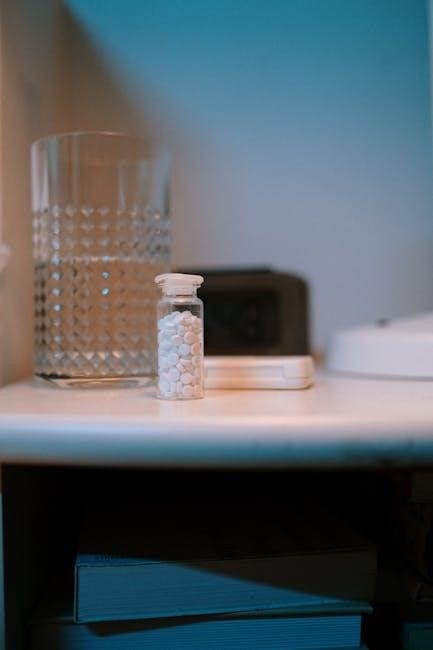
Establishing a Sleep Routine
Establishing a sleep routine involves creating consistent bedtime practices and schedules to improve sleep quality. A structured routine helps regulate the body’s internal clock effectively.
3.1 Setting a Consistent Sleep Schedule
Setting a consistent sleep schedule is crucial for improving sleep hygiene. Experts recommend going to bed and waking up at the same time daily, including weekends. This helps regulate the body’s internal clock, enhancing the quality of sleep. A fixed routine ensures the brain associates specific times with sleep, making it easier to fall asleep and stay asleep. Consistency is key to achieving restful and rejuvenating sleep every night.
3.2 Creating a Relaxing Bedtime Routine
A relaxing bedtime routine signals the body to prepare for sleep. Activities like reading, taking a warm bath, or practicing gentle stretches can help unwind the mind and body. Avoiding screens and stimulants before bed is essential. Dimming lights and creating a calm environment also promotes relaxation. Consistency in these routines reinforces healthy sleep patterns and improves the quality of rest, making it easier to fall asleep and stay asleep throughout the night.
3.3 Optimizing the Sleep Environment
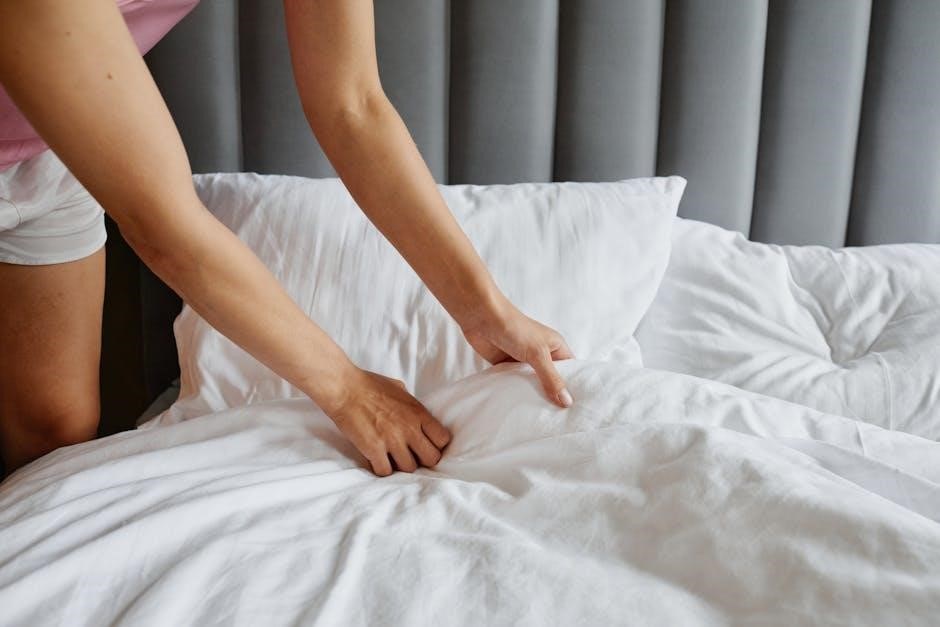
Creating an ideal sleep environment is crucial for quality rest. Ensure your bedroom is dark, quiet, and cool, as these conditions promote deeper sleep. Invest in a comfortable mattress and pillows to support proper posture. Minimize distractions by removing electronic devices and clutter. Reserve the bed for sleep and intimacy, avoiding work or recreational activities. A peaceful environment signals the brain that it’s time to rest, enhancing sleep duration and overall sleep hygiene practices effectively.
Common Sleep Disorders Related to Poor Sleep Hygiene
Poor sleep hygiene can lead to disorders like insomnia, sleep apnea, and restless legs syndrome, disrupting sleep quality and overall health significantly over time.
4.1 Insomnia
Insomnia is a common sleep disorder characterized by difficulty falling or staying asleep, despite adequate opportunities to do so. It can be acute or chronic, significantly impacting daily functioning and overall health. Poor sleep hygiene practices, such as irregular sleep schedules or consuming stimulants before bed, often contribute to insomnia. Addressing these habits through consistent routines, a calming bedtime environment, and avoiding screens can help alleviate symptoms and improve sleep quality over time.
4.2 Sleep Apnea
Sleep apnea is a serious disorder where breathing repeatedly stops and starts during sleep, disrupting sleep quality. It can lead to daytime fatigue, cardiovascular issues, and other health problems. While sleep hygiene practices like maintaining a consistent schedule and a relaxing environment are beneficial, sleep apnea often requires specific medical interventions, such as CPAP therapy or lifestyle changes, to manage effectively. Addressing underlying factors like weight management and avoiding alcohol can also improve symptoms and overall sleep health.
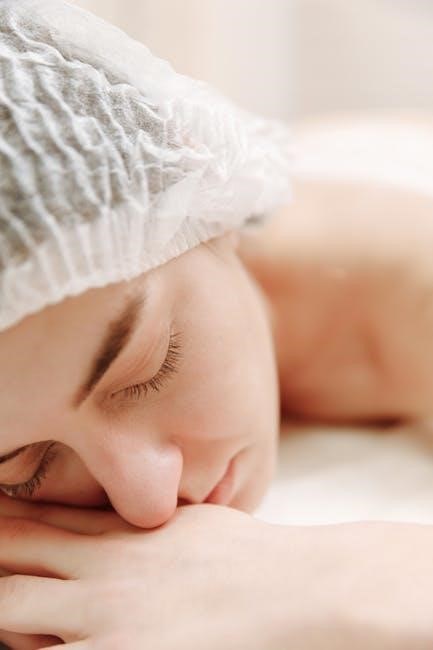
4.3 Restless Legs Syndrome
Restless Legs Syndrome (RLS) is a condition causing an irresistible urge to move the legs, often due to uncomfortable sensations. It typically occurs in the evening or during sleep, disrupting rest. Poor sleep hygiene can exacerbate symptoms, such as irregular sleep schedules or consumption of stimulants. Managing RLS involves avoiding caffeine and alcohol, incorporating physical activity, and maintaining a consistent sleep routine. Spanish-language guides recommend these strategies to alleviate symptoms and improve sleep quality for those affected by RLS.

Tips for Improving Sleep Hygiene
Establishing a consistent sleep schedule, avoiding stimulants before bed, and limiting screen time can significantly enhance sleep quality and promote relaxation.
5.1 Avoiding Stimulants Before Bed
Avoiding caffeine, energy drinks, and sugary beverages after 4:00 PM is crucial for improving sleep hygiene. These stimulants interfere with the body’s natural sleep-wake cycle, making it harder to fall asleep and reducing sleep quality. Experts recommend opting for herbal teas or water instead to promote relaxation and ensure a restful night’s sleep. This simple change can significantly enhance overall sleep hygiene practices.
5.2 Limiting Screen Time
Limiting screen time before bed is essential for improving sleep hygiene. The blue light emitted from devices like smartphones, tablets, and computers suppresses melatonin production, making it harder to fall asleep. Experts recommend avoiding screens for at least an hour before bedtime. Instead, opt for relaxing activities like reading or meditation to promote better sleep quality. Using night mode or blue light filters can also help reduce the negative effects of screen time on sleep.
5.3 Incorporating Physical Activity

Regular physical activity enhances sleep quality, but timing is key. Exercise can increase alertness and body temperature, which may disrupt sleep if done too close to bedtime. Experts suggest engaging in moderate exercise, like walking or yoga, earlier in the day. Avoid vigorous workouts within three hours of bedtime. Consistent physical activity helps regulate sleep patterns and improves overall sleep hygiene, contributing to deeper and more restorative sleep. A balanced routine supports better rest and health.
The Role of Diet and Nutrition in Sleep
Diet plays a crucial role in sleep quality. Foods rich in melatonin, like walnuts and cherries, and tryptophan, found in turkey, promote better rest. Avoid caffeine, nicotine, and heavy meals before bed for improved sleep hygiene.
6.1 Foods That Promote Better Sleep
Certain foods naturally support sleep quality. Tryptophan-rich foods like turkey, chicken, and fish promote serotonin production, aiding relaxation. Tart cherries and walnuts are high in melatonin, regulating sleep-wake cycles. Complex carbohydrates, such as whole grains, increase serotonin levels, fostering calmness. Incorporating these foods into your diet can enhance sleep hygiene and improve overall rest. A balanced nutrition plan is essential for maintaining healthy sleep patterns.
6.2 Foods to Avoid for Restful Sleep
Certain foods can disrupt sleep quality. Caffeinated beverages like coffee and energy drinks can interfere with sleep cycles. Heavy meals close to bedtime may cause indigestion, discomfort, and difficulty falling asleep. Sugary and processed foods can lead to energy fluctuations, affecting sleep patterns. Alcohol, while initially sedative, disrupts deep sleep stages. Avoiding these foods, especially before bed, is crucial for maintaining good sleep hygiene and ensuring restful nights.
Sleep Hygiene for Specific Populations
Sleep hygiene practices vary across age groups. Children benefit from consistent routines, while adults must balance work and rest. Elderly individuals may need tailored strategies to address health challenges.
7.1 Sleep Hygiene for Children
Establishing consistent sleep schedules and bedtime routines is crucial for children. Parents should create calming pre-sleep activities, such as reading, to signal bedtime. Ensuring the sleep environment is comfortable and free from distractions helps improve sleep quality. Avoiding screen time before bed and promoting physical activity during the day can also enhance sleep hygiene in children.
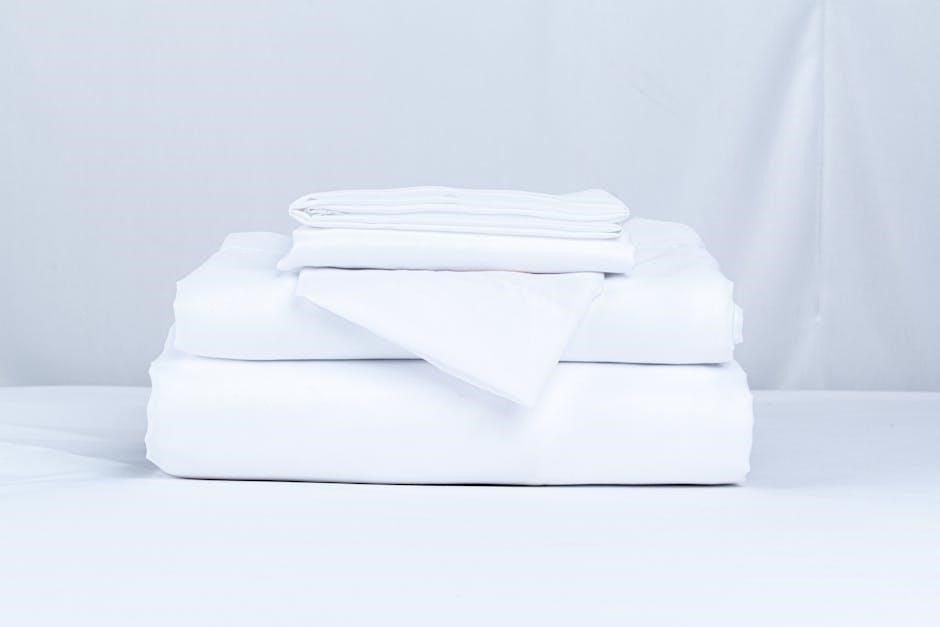
7.2 Sleep Hygiene for Adults
Adults can improve sleep hygiene by maintaining a consistent sleep schedule and avoiding stimulants like caffeine and nicotine close to bedtime. Limiting screen time and creating a relaxing bedtime routine, such as reading or taking a warm bath, can enhance sleep quality. Additionally, avoiding heavy meals and alcohol before bed promotes better rest. A quiet, dark sleep environment and regular physical activity during the day further support healthy sleep habits for adults.
7.3 Sleep Hygiene for the Elderly
Elderly individuals can benefit from tailored sleep hygiene practices. Maintaining a consistent sleep schedule is crucial, as is creating a comfortable sleep environment with appropriate lighting and temperature. Engaging in light physical activity during the day and avoiding stimulants close to bedtime can improve sleep quality. Additionally, limiting naps and ensuring the bedroom is reserved for sleep can help address common sleep challenges faced by older adults, promoting overall well-being and health.
Technology, especially screen time, disrupts sleep by emitting blue light, tricking the brain into staying awake. Minimizing screen use before bed improves sleep quality and duration.
8.1 Effects of Blue Light on Sleep Quality
Blue light from devices suppresses melatonin production, delaying sleep onset. Prolonged exposure disrupts circadian rhythms, leading to poor sleep quality. To mitigate effects, use blue light filters or dim screens.

The Impact of Technology on Sleep
8.2 Managing Screen Time Before Bed
Limiting screen time before bed improves sleep quality. Establish a “no screens” rule at least an hour before bedtime. Use calming activities like reading to wind down instead of devices.
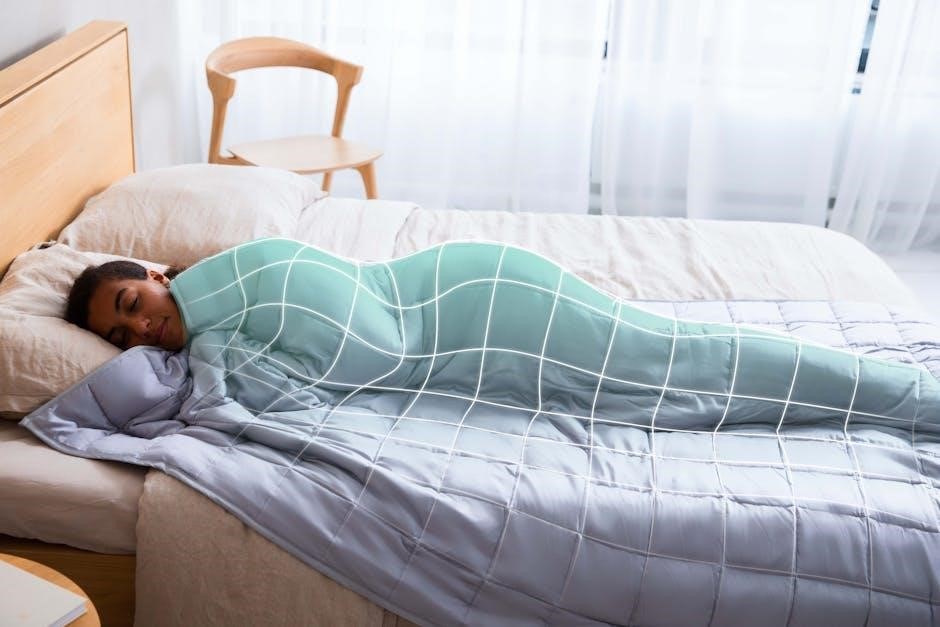
Resources for Spanish-Speaking Individuals
Spanish-language PDF guides on sleep hygiene are available online, offering practical tips and recommendations. Websites like SciELO provide accessible resources for improving sleep habits in Spanish-speaking communities.
9.1 Spanish-Language PDF Guides on Sleep Hygiene
Spanish-language PDF guides provide comprehensive insights into improving sleep hygiene. These resources, available from sources like SciELO, offer practical advice on establishing routines, avoiding stimulants, and optimizing sleep environments. They emphasize the importance of a regular sleep schedule and creating a relaxing bedtime routine. Additionally, these guides address common sleep disorders and provide tailored tips for different populations, including children, adults, and the elderly. They serve as invaluable tools for fostering better sleep habits in Spanish-speaking communities, ensuring accessible and actionable information for all. By following the recommendations outlined in these guides, individuals can enhance their sleep quality and overall well-being. These PDFs are widely accessible online, making them a convenient resource for anyone seeking to improve their sleep hygiene practices. Furthermore, they often include expert-endorsed strategies, making them reliable sources for those looking to address sleep-related challenges effectively. Overall, these guides play a crucial role in promoting healthier sleep habits within Spanish-speaking populations, offering a wealth of information in an easily digestible format. Their availability has made it easier for individuals to prioritize their sleep health without language barriers, ensuring that everyone can benefit from improved sleep hygiene practices. This accessibility is particularly important for diverse populations seeking to adopt healthier lifestyles and improve their quality of life through better sleep. The guides are regularly updated with the latest research and expert recommendations, ensuring that the information remains current and relevant. They are an essential resource for anyone looking to take control of their sleep health and make positive changes to their daily routines. By leveraging these guides, individuals can gain a deeper understanding of sleep hygiene and implement effective strategies to enhance their sleep quality, leading to better physical and mental health outcomes. The widespread availability of these Spanish-language PDF guides underscores the growing recognition of sleep hygiene’s importance in overall health and well-being. As a result, they are a vital tool for promoting healthier sleep habits and improving quality of life within Spanish-speaking communities worldwide. Their impact is evident in the positive changes individuals report after implementing the suggested practices, highlighting the effectiveness of these guides in addressing sleep-related challenges. In conclusion, Spanish-language PDF guides on sleep hygiene are indispensable resources that empower individuals to take charge of their sleep health, offering expert advice and practical strategies in an accessible format. They continue to be a valuable asset for anyone seeking to improve their sleep hygiene and enhance their overall health and well-being.
9.2 Recommended Reading Materials
Spanish-language reading materials on sleep hygiene are widely available, offering expert advice and practical tips. Books and guides from reputable sources like SciELO provide comprehensive insights into improving sleep quality. These resources often include strategies for maintaining a consistent sleep schedule, creating a relaxing bedtime routine, and avoiding stimulants. They are ideal for individuals seeking to enhance their sleep habits and overall health. Many materials are tailored for specific audiences, such as children or adults, ensuring relevant and actionable advice. These readings are invaluable for fostering better sleep hygiene practices in Spanish-speaking communities, making them essential tools for anyone looking to improve their sleep health. By leveraging these resources, individuals can gain a deeper understanding of sleep hygiene and implement effective strategies to enhance their well-being. The availability of these materials in Spanish ensures that language barriers do not hinder access to critical information on sleep health, empowering individuals to take control of their sleep habits and improve their quality of life. These recommended readings are a cornerstone for anyone seeking to adopt healthier sleep practices and address common sleep-related challenges effectively. Their practical advice and expert-endorsed strategies make them indispensable for achieving restful and rejuvenating sleep. Overall, these materials are a vital resource for promoting better sleep hygiene and improving overall health outcomes in Spanish-speaking populations worldwide.